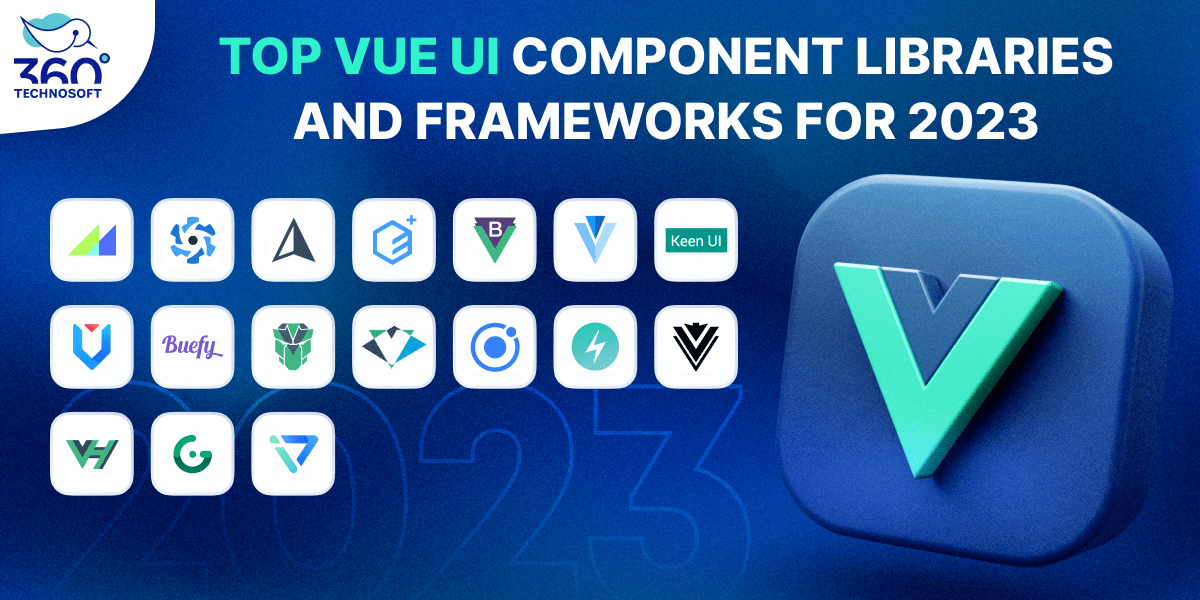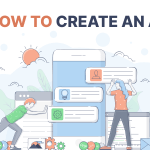The dynamic features that JavaScript offers to developers make it one of the best programming languages for designing UIs and single-page applications. It contains event-driven, goal-specific, and other helpful features. One of the best front-end frameworks in JavaScript, Vue.js can deconstruct a website page into multiple elements. UI components libraries make this process much easier. Many of them can aid you in the development process.
Why Pick Vue.js?
For a simple reason, it is one of the most popular JavaScript frameworks and according to a 2023 survey by StackOverflow, regarded amongst the top 10 most beloved frameworks in the world.
Some of the reasons for the popularity of this framework are:
- Component-based Architecture- Due to Vue’s Model-View-ViewModel Architecture, UI and business logic become two separate entities. This architecture allows the developer to build recycled code bits that can be systematically updated.
- Lightweight- It is programmed to be lightweight which means that the base app is not more than 16KB.
- Multi-faceted Community- Released in 2014, Vue took the programming industry to a whole new level. The community consists of a range of members with multiple useful tools and libraries.
Vue Libraries
There is a collection of libraries that Vue comprises which simplify the web development journey. Many pre-written coding pieces can aid you in developing UIs, styling, state management, and form management along with other tasks. You can build user interfaces swiftly with the help of Vue libraries. The Vue UI framework can be used in the following ways:
- Pre-built components: The boilerplate code offered by these libraries helps developers out and saves a lot of time.
- Community Support: Libraries having active communities are the best choices a developer can make to choose from. Members of the community will help you out if you hit a brick wall while developing.
- Picking the right framework or library: It can be tricky to pick the best library/framework from an ocean of them. So make sure to research and scrutinize the field to help you make that choice.
Vue.js Libraries and Frameworks
1. Vuetify
This framework allows developers to build fast and feature-rich web applications. With a high emphasis on the user experience, this tool offers all the help necessary to build the app. Some of the features of this framework are:
- Flexible Components: Google’s Material Design specifications make the crux of the principles of these components incorporated into this framework. They support multiple customization approaches based on several styles and designs.
- Global Defaults: While setting up a Vuetify app, you can calibrate default prop values for each component or globally. It is much easier to reuse codes and limit the duplicate code in your content using global classes or styles.
- Dynamic Themes: There are two themes that Vuetify offers that are easily customizable to suit your requirements. You can make changes according to your needs to the colors and fonts to blend with the brand.
2. BootstrapVue
This library allows you to develop mobile-first responsive apps with the help of Bootstrap and Vue.js. This framework contains 1200+ icons, 54+ plugins, and 85+ components that help you in developing web apps. Some of the features of BootstrapVue are:
- Modular: The components in this library are dissociated into smaller, reusable pieces of code. As a result, only relevant information is imported into your application.
- Responsive: Since Bootstrap is the most popular framework to use for responsive design, you will see apps developed from this framework utilized in different screen sizes effectively.
- Configurable: This framework lets you develop themes using SCSS variables. Declare these variables globally and reuse them throughout your application.
3. Quasar
Another cross-platform Vue.js framework, Quasar is built with components that follow Material Design principles. You can add simple or complex setups to your application with the help of Quasar App Extensions. You can also utilize the Unified Module Definition and integrate JS, CSS, and HTML tags into your application. Some of the features of the Quasar library are:
- All-in-one platform: The same source code can be used to develop mobile, web, desktop, and progressive web applications.
- Automated testing and auditing: To instantly test your app, integrate Unit and End-to-End testing.
- A multitude of responsive web components: There are individual components assigned for every feature you want to develop with your Quasar application.
4. Vuesax
This is a framework of User Interface components developed with the help of Vue.Js.The developer can exercise his/her creativity in this one since it offers them components with a rejuvenating design and individual customizations. Below mentioned are a few features of Vuesax:
- Modular: The components of this framework can be utilized on-demand since the code is divided into small-reusable bits.
- Easy to use: Vuesax does not require high-class skills or knowledge in JavaScript or Vue. It is a well-documented framework that requires minimum knowledge to get started with.
- Unique components: As it does not follow any design patterns, it offers unique designs you cannot witness in other frameworks.
5. Ant Design Vue
This one is a combination and collection of UI components of Anti Design and Vue. User Interactive interfaces can be built using these designs. You can build your application by downloading Ant Design Vue through npm or Yarn. Some of the features of Ant Design Vue are listed below:
- Multi-environment support: Applications developed using this framework are supported by modern browsers. This framework can also be run on Electron and is compatible with server-side rendering.
- Customizable themes: You can customize the default theme on Ant Design Vue to make it suitable for your brand or business requirements. You can switch things up such as border-radius, border color, and primary color to your own accord.
6. Element
Another Vue-based component library, this one is specifically used by project managers, designers, and developers. This library follows real-life logic and understands common users’ habits. It is also available for React and Angular. Some of the features of Element are listed below:
- Customizable theme: It has a customizable default theme that is preferable to your needs and requirements. There is also the option of importing a custom theme.
- Easy to use: Element can be installed with the help of a package manager such as npm or yarn. Following this, you can choose the components that you like and add them to your application.
- Navigation: ‘Sidebar navigation’ and ‘top navigation’ are used to simplify user interactions.
7. Buefy
This is a directory of lightweight user interface components for Vue based on Bulma. This component is programmed to act as a JavaScript layer for the Bulma interface. This framework can be installed by package managers or directly added to your project using CDN links. Some of the features of Buefy are listed below:
- Modern: This framework is developed using Vue.js and Bulma. This component library is not dependent on any other framework.
- Responsive: The apps developed using Buefy can be used on devices or personal computers.
- Modern: Due to the dalliance of Vue.js and Bulma in this framework, the components are new and understand modern design patterns.
- Customizable: You can customize a variety of things from this library to your preferences.
8. Chakra UI
Chakra helps in building Vue applications swiftly as it is a modular component library with individual building blocks to enhance the speed of development. This library can be downloaded using npm and it comprises only one peer dependency which is @emotion/css. Some of the features of Chakra UI include:
- Accessibility: This library is programmed according to the standards of WAI-ARIA.
- Themeable: Any component or the complete application can be themed or referenced with values.
- Composable: You can build simple or complex UIs by leveraging components from the library and incorporating them with other frameworks/libraries.
9. Prime Vue
Another collection of components to develop Vue applications, Prime Vue can help you build apps with CSS frameworks such as Bootstrap, Tailwind, or Prime Flex. All you have to do is use this library in ‘Unstyled’ mode. There are more than 90 Prime Vue components to adapt to multiple needs. These components are separated into different categories to make development much more convenient. Some of the features of Prime Vue are:
- Templates: There are multiple professionally designed templates offered in this library that can be customized based on your requirements.
- Customizable themes: Your base theme can be anything from CSS frameworks such as Material UI, Bootstrap, and Tailwind.
- Theme designer: This library also offers the necessary toolkit to design such themes.
10. Semantic UI Vue
When you integrate Vue.js with Semantic UI, you get Semantic UI Vue. You can make necessary adjustments to its code before importing it into your app. All you need to do is download Semantic UI Vue through npm, import it to the main.js or index.js file, and finally import the components of it. Some of its features include:
- Elaborate documentation: Although this component library is still under development, it is documented extensively.
- Theming and Customization: Certain components in this library can be used by the developer to fit your brand’s vision and voice.
- Responsive Design: The design components of this library can work in perfect condition on different screen sizes.
11. Keen UI
Inspired by Google’s Material Design, Keen UI is a lightweight component library. The purpose of this library is to offer interactive components that need JavaScript. The majority of the CSS platforms utilize Keen UI. Some of the features of Keen UI are given below:
- Customization Support: The many elements of the app can be customized with the help of Keen UI such as component sizes, colors, as well as default props.
- Easy to Use: Can be downloaded easily through npm and import its components to make complete use of it.
- Browser Support: All major browsers supported by Vue 3 are also supported by Keen UI.
12. Core UI
You can develop interactive applications with the help of Core UI which is an integration of Vue.js UI components and Vue.js Admin Templates. The library also provides the user with all the tools necessary to build functioning and modern Vue applications. Some of the features of Core UI are provided below:
- Cross-browser responsiveness and compatibility: Most modern browsers can make use of Core UI. They also support different operating systems and multiple screen sizes.
- Not a requirement to be a designer: You can develop apps using this library even if you have no skills as a designer. To suit your needs, Core UI has professionally designed custom templates.
- Ease and Convenience: The components of UI and Widgets on Core UI can be easily written and readable. You can customize your app based on your needs by going to the code of your components.
13. Vue Material
This framework integrates Vue.js with Material design specs. The platform provides an easy-to-use API, dynamic themes, and on-demand components to simplify the development process. Some of the features of Vue Material are listed below:
- Custom Themes: As long as you are using SASS/SCSS support in your project, you can develop a custom theme for it as well.
- Plethora of components: This framework has ingrained almost every component required to develop web applications that are more recent. Some instances of these applications include Avatars, Alerts, Datepickers, Cards, Buttons, and Forms.
- Themes: There are pre-installed themes in Vue Material to customize in your application. You can customize all of these themes according to your preference.
14. Vue Tailwind
Optimized specifically for Tailwind CSS, Vue Tailwind is a collection of components that are built from unlimited variants and custom classes that can be later customized into your application. Some of the features of Vue Tailwind include:
- Theme Builder: There are options for you to develop your theme, customize, visualize, and import the components into your application.
- Modular: This framework is programmed in a way that allows you to only import the necessary parts of your application.
- Multiple Components: There are multiple components categorized into several categories in this framework. It is up to you to customize the components, visualize how they will finally appear on the screen, and implement them in the final version of your application.
Conclusion
These are a few collection libraries you can use at your expense to enhance the Vue app development process for your UI. Out of these, there are a few that offer the fundamental tools to build a functional UI while others allow advanced features and everything else necessary to build your own Vue application.
However, make note of the fact you might need only the one that fits your business needs perfectly. Implementing something that you need rather than something complex is the smart choice to make as an app developer and owner.
Frequently Asked Questions (FAQ)
1. What is a Vue Component Library?
It is a collection of components that can be reused for developing picturesque UI through custom HTML elements in your Vue.js project.
2. What is the best Vue UI component library?
There are many component libraries considered to offer the majority of the tools to develop a functional UI; however, Element Plus is considered to be one of the best as it offers the most recent components. This library is capable of creating some of the most complex Vue applications.
3. Why should one pick Vue for Web UI development?
The following reasons imply why Vue is the best choice for web UI development:
- High performance
- Easy to learn
- Reactive data binding
- High flexibility
- Condition data binding
4. How many components are there in Vue?
There are a total of three components available. These components are Template, JavaScript, and Stylesheet respectively.
5. Why are Vue frameworks so popular?
Some of the reasons why Vue frameworks are popular amongst the developers’ community are:
- Simple learning curve
- Reduced development time
- Vivid design and components
- User-friendly


